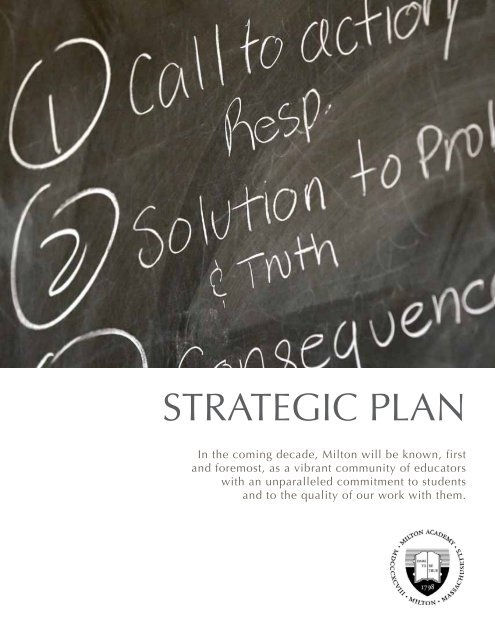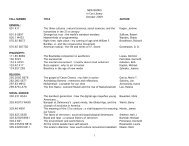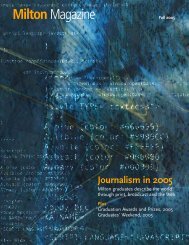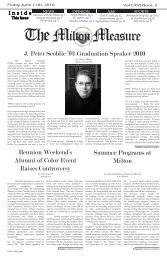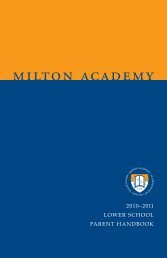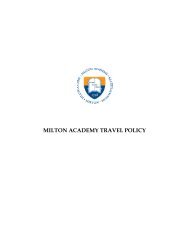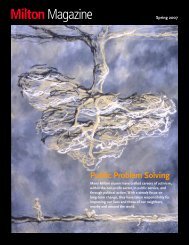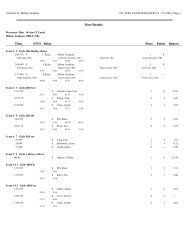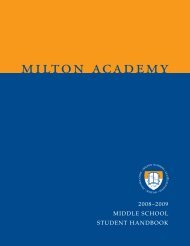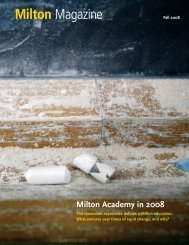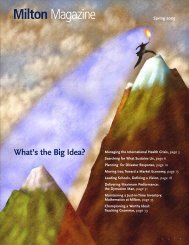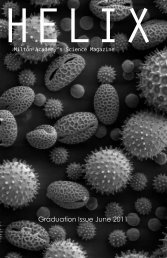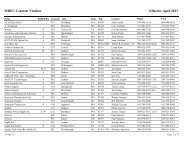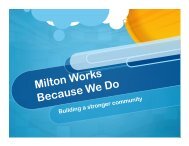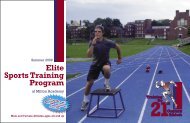Full Strategic Plan - Milton Academy
Full Strategic Plan - Milton Academy
Full Strategic Plan - Milton Academy
Create successful ePaper yourself
Turn your PDF publications into a flip-book with our unique Google optimized e-Paper software.
STRATEGIC PLAN<br />
In the coming decade, <strong>Milton</strong> will be known, first<br />
and foremost, as a vibrant community of educators<br />
with an unparalleled commitment to students<br />
and to the quality of our work with them.
A VISION FOR MILTON<br />
For generations, engaging academics, devoted teachers, and<br />
broad opportunities for intellectual and personal growth<br />
have been <strong>Milton</strong> hallmarks. In the coming decade, <strong>Milton</strong><br />
will be known, first and foremost, as a vibrant community of<br />
educators with an unparalleled commitment to students and<br />
to the quality of our work with them.<br />
Three defining goals will shape <strong>Milton</strong>’s future and<br />
strengthen the fundamental traditions of the School:<br />
• We will build the highest quality and strongest faculty,<br />
providing both the tools and the support for teachers<br />
to excel at their profession. Meeting this goal means<br />
providing compensation that fully recognizes the<br />
commitment teachers make to this crucial profession and<br />
to <strong>Milton</strong>. To succeed, we must also recruit and retain a<br />
diverse faculty.<br />
• We will consistently and rigorously renew our<br />
curriculum, relying on purposeful dialog among our<br />
faculty, and between our faculty and educational leaders<br />
outside <strong>Milton</strong>. This approach to curriculum will achieve<br />
and sustain genuine innovation over time, focusing on<br />
long-term excellence above short-term trends.<br />
• We will continue to enroll diverse, multi-dimensional<br />
students; help them develop their passion for learning;<br />
and explicitly cultivate mutual caring, respect, and<br />
understanding among them. <strong>Milton</strong>’s students will<br />
continue to be a daily manifestation of our mission and<br />
values.<br />
These commitments will stimulate creativity across the<br />
School, and also preserve our core strengths: the excellence<br />
of our faculty and the transformative relationships between<br />
teachers and students.<br />
Realizing these commitments will require all of us at <strong>Milton</strong><br />
to hold ourselves fully accountable for our work as educators<br />
— to meet absolutely the highest standards for fostering<br />
extraordinary growth in each of our students.
THE PLANNING PROCESS<br />
A Comprehensive Process Leads to Shared Goals<br />
and Action <strong>Plan</strong>s<br />
<strong>Milton</strong> <strong>Academy</strong>’s strategic planning process began in<br />
September 2011. <strong>Milton</strong>’s board of trustees adopted the<br />
resulting priorities, objectives and implementation plans in<br />
January 2013. A successful reaccreditation process with the<br />
New England Association of Schools and Colleges (NEASC)<br />
immediately preceded strategic planning.<br />
<strong>Milton</strong> approached strategic planning from a position of<br />
strength. Developing a strategic plan to guide decisions and<br />
action for the next five years was a critical step in a severalyear<br />
period of reflection, discussion and analysis at <strong>Milton</strong>.<br />
Under the leadership of the trustees and Todd Bland, head<br />
of school, the strategic plan sets clear priorities for <strong>Milton</strong><br />
and provides a foundation for an upcoming fundraising<br />
campaign.<br />
An extensive and consistent communication effort secured<br />
valuable input from every <strong>Milton</strong> constituency over the<br />
course of the planning. <strong>Milton</strong> shared the emerging themes<br />
and content of the planning with faculty, staff, parents,<br />
students and alumni. A strategic planning Web site with<br />
feedback tools provided extensive and timely information,<br />
and also garnered the perspectives of people from around<br />
the globe who care about <strong>Milton</strong>. Communication included<br />
two years of events—national and international—online<br />
newsletters, Web site articles, letters, and two live webcasts<br />
with opportunities for live questions and feedback.<br />
<strong>Plan</strong>ning Structure<br />
<strong>Strategic</strong> planning involved many <strong>Milton</strong> faculty,<br />
administrators and trustees. Principal planning groups<br />
included:<br />
<strong>Strategic</strong> <strong>Plan</strong>ning Steering Committee—trustees, faculty<br />
and administrators who met throughout the process to shape<br />
the planning agenda, review intermediate analysis, and offer<br />
feedback on priorities and goals (eight meetings).
<strong>Strategic</strong> <strong>Plan</strong>ning Task Forces on Education, Student Life and Faculty—Task Forces, with<br />
administrators, faculty, trustees and staff, met from January to April 2012, and presented<br />
recommendations to the trustees in May 2012 (13 Task Force meetings and three sessions<br />
with Task Force co-chairs).<br />
Resources Working Group—trustees and administrators who convened during the<br />
planning to discuss crosscutting financial topics and link the strategic planning to work in<br />
budget, facilities and campaign planning (five meetings).<br />
Faculty—met as a whole, and as K–8 and Upper School groups, to discuss strategic<br />
planning topics in fall 2011, spring 2012, and fall 2012 (three meetings in each division).<br />
Twenty-eight faculty members also participated in the Task Forces.<br />
Integration Team—the Task Force and Resources Working Group co-chairs, the Steering<br />
Committee chair, and administrative leadership met over the summer and early fall 2012<br />
to review the work of the Task Forces, incorporate trustee and Steering Committee input,<br />
and develop a draft set of priorities (nine meetings).<br />
Trustees—held planning sessions in January, May, and October 2012.<br />
Members in these planning groups also represented the perspectives of parents, parents of<br />
graduates, and alumni.
EDUCATION<br />
True to our mission, <strong>Milton</strong> cultivates in students a love for<br />
approaching intellectual challenge with curiosity, creativity<br />
and confidence. Throughout their lives, <strong>Milton</strong> graduates<br />
will rely on knowledge of the world and on intellectual<br />
and personal skills that they developed here. At <strong>Milton</strong>,<br />
the fullness of learning happens both in and beyond the<br />
classroom, in active engagement with adults and a diverse<br />
student community, where the focus is on character as well<br />
as competence. To encourage lives of vitality, <strong>Milton</strong> should<br />
foster responsibility, reward resilience, and encourage<br />
initiative. Every adult should encourage intellectual flexibility<br />
and perseverance as well as affirm the value of commitment<br />
and understanding. Our curriculum must balance innovation<br />
and creativity with enduring strength in academic disciplines<br />
and skills. <strong>Milton</strong>’s educational program must be open to<br />
change while maintaining strength and purpose. Evaluating<br />
ourselves routinely and creating relevant change is the right<br />
approach for <strong>Milton</strong>, focusing on long-term excellence<br />
above short-term trends.<br />
We will realize our vision for the <strong>Milton</strong> educational<br />
program through articulating a framework of competencies;<br />
continually renewing our curriculum; creating a more<br />
consistent and comprehensive approach to advising; and<br />
building on the strength of our efforts in character and<br />
leadership education.<br />
Objectives<br />
• Articulate a framework of competencies—those areas<br />
for learning and development that frame our curriculum,<br />
express our educational values, and define areas of<br />
mastery for our students. The framework will include<br />
cognitive, intrapersonal and interpersonal competencies.<br />
• The most effective institutional and pedagogical<br />
response to change and the emerging needs of students<br />
is the quality and relevance of our curriculum. We will<br />
consistently and rigorously renew our curriculum, K–12,<br />
relying on our faculty—in dialogue with each other and<br />
with educational leaders outside <strong>Milton</strong>. Within the next<br />
three years, complete a comprehensive curriculum
enewal that includes all disciplines and curriculum strands, Upper School and K–8,<br />
as well as particular School-wide themes.<br />
• When advisors are well prepared and positioned they can be singularly powerful.<br />
Advisors can integrate the academic, social and emotional development of students.<br />
We will significantly strengthen <strong>Milton</strong>’s advising program and centralize advising in<br />
a student’s experience at <strong>Milton</strong>. We will define the advisor’s role more clearly, and<br />
both prepare and empower advisors to guide their students most effectively. Similarly,<br />
we will better define positive and developmentally appropriate partnerships with<br />
parents, recognizing their valuable insights and perspectives. We intend to strengthen<br />
our engagement with parents, including parents of boarding students, since advisors at<br />
<strong>Milton</strong> serve in loco parentis.<br />
• Young people must develop awareness of themselves, their communities, and the<br />
world around them. Essential skills for an active <strong>Milton</strong> education include being able<br />
to articulate vision and direction, build teams, facilitate cooperation and collaboration,<br />
and incorporate the perspectives of others. Building on our existing efforts in this area,<br />
and considering students’ emerging needs, <strong>Milton</strong> will develop new approaches to<br />
character and leadership development among students.<br />
Framework of Competencies<br />
<strong>Milton</strong> will define areas of focus for student learning and development. These articulated<br />
competencies—cognitive, intrapersonal and interpersonal—frame our curriculum, express<br />
our educational values, and define areas of mastery for our students. They will guide the<br />
effort to renew curriculum, in the Upper School and in K–8.<br />
Cognitive competencies:<br />
• critical thinking (interpretation, analysis, and synthesis of textual, visual and<br />
quantitative evidence; reasoning; argumentation; problem-solving)<br />
• creativity (imagination and innovation)<br />
• communication (written, oral and visual expression; creative and imaginative<br />
expression; cross-cultural exchange)<br />
Intrapersonal competencies:<br />
• openness (flexibility, curiosity, adaptability)<br />
• strength (initiative, responsibility, resilience, grit, integrity)<br />
• self-awareness (self-evaluation, self-discipline, metacognition)<br />
Interpersonal competencies:<br />
• understanding perspective (empathy, cultural awareness, appreciation for diverse<br />
experience)<br />
• collaboration (team-building, cooperation, conflict resolution)<br />
• leadership (service, vision, courage)
Curriculum Renewal<br />
Within the next three years, <strong>Milton</strong> will renew our curriculum, K–12, relying on our<br />
faculty, in dialogue with each other and with educational leaders from outside of <strong>Milton</strong>.<br />
Renewal includes all disciplines and curricular strands, as well as particular School-wide<br />
themes.<br />
Upper School<br />
Curriculum renewal in the Upper School will occur through a continuous process, at<br />
regular intervals. The Upper School leadership team and a steering committee will oversee<br />
the reviews, led by each department. The renewal process will deliberately engage<br />
expertise and perspectives from outside of <strong>Milton</strong>.<br />
Each department will take responsibility for completing a review of the curriculum that<br />
responds to:<br />
• students’ current and anticipated needs for knowledge and skills in the particular<br />
discipline;<br />
• emerging trends in content and modes of instruction from outside of <strong>Milton</strong>;<br />
• opportunities for collaboration within the discipline and across disciplines;<br />
• opportunities to use off-campus resources to enrich the classroom education,<br />
provide real-time exploration, and apply competencies;<br />
• the role of technology in supporting teaching and learning;<br />
• appropriate assessment strategies.<br />
The Upper School has established an initial sequence of departmental reviews.<br />
The steering committee and leadership team will work across departmental reviews<br />
to address common objectives and issues, and develop integrated solutions and<br />
improvements. These will include: graduation requirements, meeting common curricular<br />
and educational goals (e.g. “analytical thinking, data analysis, and writing”), schedule,<br />
workload and pace, and technology.<br />
K–8<br />
The principal will establish a K–8 Curriculum Committee (2013) charged with reviewing<br />
grade-level and cross-grade curriculum to achieve greater depth and sequential cohesion,<br />
and to develop sustainable mechanisms for ongoing innovation and renewal. The<br />
Committee will:<br />
• act as a design lab to seed K–8 program ideas; research best practices; provide<br />
leadership in incorporating leading-edge innovations;<br />
• develop consistent principles and authentic approaches for assessing student<br />
learning in K–8;<br />
• solicit faculty proposals for rewriting grade-level curricula; make recommendations<br />
to administration about these proposals.
!"##$%"&"'()*+$*,(-$'*&$.*<br />
!"#$ !"#% !"#& !"#' !"#(<br />
/01<br />
)17@EF.1;9/45:<br />
FP,8
K–8 will use its comprehensive curriculum map (completed in 2012) to evaluate gaps,<br />
identify cross-grade connections, and highlight opportunities.<br />
The principal and the Curriculum Committee will establish an overall schedule of review<br />
projects. A review team, responsible to the Curriculum Committee, will direct each<br />
project. View the Curriculum Review Timeline for the 2013–2018 schedule of reviews.<br />
K–8 curriculum review will also address schedule and workload for K–8 students,<br />
including opportunities to use time more effectively in support of curriculum goals; the<br />
role of technology in K–8 curriculum; the identification of new instructional technology;<br />
and staffing models that can support greater flexibility and innovation.<br />
School-wide<br />
Curriculum renewal efforts will also consider School-wide priorities:<br />
• Develop points of engagement with the world outside <strong>Milton</strong>, including global and<br />
international perspectives that expand both intellectual and experiential horizons for<br />
students.<br />
• Support the health and well-being of students by attending to their social and<br />
emotional needs in a context of rigorous academic and extracurricular life. Address<br />
questions of pace and workload across K–12 during the curriculum renewal process<br />
and consider the use of time as a catalyst to well-being.<br />
• Take better advantage of <strong>Milton</strong>’s proximity to Boston, its intellectual and creative<br />
resources, and its diverse communities, as a catalyst to new approaches to learning<br />
and understanding.<br />
• Create mechanisms in the curriculum to connect students across grades in K–12 in<br />
meaningful ways.<br />
K–8 and Upper School curriculum renewal feed directly into other aspects of the strategic<br />
plan, including faculty professional development, master planning (in terms of academic<br />
facility needs driven by new curriculum strategies), and technology planning.<br />
Advising<br />
More than ever, <strong>Milton</strong> students need ready and regular access to adults who can help<br />
them make wise decisions and develop as leaders and community members.<br />
<strong>Milton</strong>’s goal is to provide every student in grades 6–12 with a variety of richly rewarding<br />
relationships with adults on campus, through our advising program. Creating a more<br />
consistent and comprehensive approach to advising for boarding and day students is an<br />
important opportunity, acknowledged during the NEASC accreditation process.<br />
Advisors integrate the academic, social and emotional development of students. When<br />
advisors are well prepared and positioned to implement their important role, the effects<br />
are often powerful and positively differentiating for their students.
<strong>Milton</strong> will recognize the distinct role of advisors, define it more clearly, and prepare and<br />
empower advisors more fully so that they can most effectively guide their students.<br />
We will better define positive and developmentally appropriate partnership with parents,<br />
recognizing their valuable insights and perspectives. We intend to strengthen our<br />
engagement with parents, including in the case of boarding students, where advisors serve<br />
in loco parentis. <strong>Milton</strong> will:<br />
• provide professional development for all advisors on working with adolescents in an<br />
educational and leadership development context;<br />
• provide advisors with systematic feedback and evaluation;<br />
• develop a framework for communication with parents that addresses the social<br />
and academic context of <strong>Milton</strong> students; the discrete and complementary roles<br />
of advisors and parents; and appropriate expectations for contact with, and<br />
communication between, advisors and parents.<br />
Leadership and Character Education<br />
Developing awareness of themselves, their communities, and the world around them is<br />
essential for young people. They also need support pursuing healthy habits, as individuals<br />
and in relationship with others.<br />
Building on the strength of our existing efforts in this area, and considering emerging<br />
needs of our students, <strong>Milton</strong> will develop new approaches to student leadership<br />
development.<br />
Leaders educated at <strong>Milton</strong> will be able to articulate vision and direction, build teams,<br />
facilitate cooperation and collaboration, and incorporate the perspectives of others.<br />
These skills are essential for an active education at <strong>Milton</strong>, and for life. Students should<br />
learn to use these leadership skills in formal and informal roles. <strong>Milton</strong> will:<br />
• articulate a <strong>Milton</strong> ideal of “citizen leader”—a student with perspective, character,<br />
empathy, confidence to collaborate and to lead when the situation calls;<br />
• create opportunities for students to develop leadership skills and practice different<br />
modes of leadership in ways developmentally appropriate K–12, both inside and<br />
outside of the classroom;<br />
• renew <strong>Milton</strong>’s Affective Education programs to add particular skills— collaboration,<br />
community building, cultural awareness and appreciation—and continue our focus<br />
on health, well-being and life skills;<br />
• create programs to connect students across grades K–12 in meaningful ways.
FACULTY<br />
Building and sustaining a community of educators whose<br />
members are connected to each other, to the principles<br />
and practices of their respective fields, and to the world<br />
outside of <strong>Milton</strong> is essential to <strong>Milton</strong>’s future. This plan<br />
asks our faculty to take on new challenges in innovating and<br />
advancing our curriculum, to rethink the role and purposes<br />
of advising, and to join in a collaborative commitment<br />
to developing youth whose interpersonal and leadership<br />
qualities are exceptional.<br />
As a voice in an often-polarized national conversation<br />
about the importance of the “classroom teacher,” <strong>Milton</strong><br />
has an opportunity and a responsibility to set and reinforce<br />
a high standard for the teaching profession and to provide<br />
our faculty with the support to achieve it. We will hold<br />
ourselves individually and collectively accountable to the<br />
highest professional standards and to the priorities we set for<br />
ourselves as educators.<br />
Competition for creative, capable and experienced teachers<br />
comes from many quarters: from <strong>Milton</strong>’s peers, from other<br />
careers and professions, and from <strong>Milton</strong>’s context in a<br />
region with a high cost of living.<br />
We want to match the commitment faculty members make<br />
to a career at <strong>Milton</strong> with the strong compensation and other<br />
career supports necessary to sustain an excellent faculty.<br />
Further, we want to improve the diversity of our faculty so<br />
that it matches our aspirations for <strong>Milton</strong> students.<br />
We will build and sustain an excellent and diverse faculty<br />
through faculty growth and professional development;<br />
compensation at leading levels among independent schools;<br />
greater faculty diversity; and support for a dynamic,<br />
inclusive School community.<br />
Objectives<br />
Growth and Professional Development<br />
• Develop a periodic, multi-year process for faculty<br />
members that includes the following components:<br />
individual growth plans for each faculty member;
ongoing and active mentoring and collaboration within and across disciplines;<br />
deliberate connection to external “best practices”; and well-defined and consistent<br />
evaluation procedures.<br />
• Provide professional development opportunities and resources to support individual<br />
growth plans and address cross-faculty needs.<br />
Compensation<br />
• Provide sustainable, competitive compensation for faculty that considers three interrelated<br />
factors: our competitive position in the hiring market; our internal and external<br />
equity based on relevant peer groups; and the cost of living for <strong>Milton</strong> faculty.<br />
• Attract the best faculty members by responding aggressively to competitive factors in<br />
the hiring market.<br />
• Effectively and appropriately support faculty members throughout their careers.<br />
• Establish a leadership position and posture for <strong>Milton</strong> regarding the importance of<br />
excellent teachers to society.<br />
• Create an effective, equitable, and sustainable approach to compensation.<br />
Diversity<br />
• Expand the diversity of <strong>Milton</strong>’s faculty and strengthen inclusiveness among faculty,<br />
staff and students at <strong>Milton</strong>.<br />
• Within a broader faculty, optimize the potential alignment between our students and<br />
the adult leaders our students encounter during their <strong>Milton</strong> years.<br />
Growth and Professional Development<br />
Develop a periodic, multi-year process for faculty members that includes the following<br />
components:<br />
• Individual growth plans for each faculty member that outline areas for professional<br />
evolution, establish strategies for developing these, and identify supporting<br />
resources. Growth plans will address both disciplinary and grade-level competencies<br />
and extend to roles “outside the classroom” such as advising and residential life.<br />
• A peer-to-peer community of practice characterized by ongoing and active<br />
mentoring, and collaboration within and across disciplines.<br />
• Deliberate connection to external “best practices” relevant to the role(s) and<br />
disciplines of each faculty member.<br />
• Well-defined and consistent evaluation practices.
Provide Professional Development Opportunities and Resources<br />
Provide professional development opportunities and resources to support individual<br />
growth plans and address cross-faculty needs:<br />
• Support individual faculty growth plans, as well as Upper School and K–8<br />
curriculum renewal.<br />
• Address advising, mentoring and leadership development, and leadership/character<br />
education.<br />
• Develop a common language for and best practices on diversity and<br />
multiculturalism, School-wide.<br />
Compensation<br />
Sustainable and competitive compensation will include appropriate growth over time and<br />
career stage; recognize the importance of teaching as a profession; and inspire long-term<br />
commitment and sustained excellence by faculty.<br />
Develop a comprehensive compensation strategy that includes:<br />
• completing a compensation study in 2013 to fully address internal and external<br />
factors and develop models for consideration;<br />
• developing a phased plan to raise the level of total compensation for faculty<br />
members and provide growth of compensation during the progression of a <strong>Milton</strong><br />
teaching career;<br />
• developing a funding mechanism for these investments that will sustain competitive<br />
total compensation over time.<br />
Diversity<br />
<strong>Milton</strong> students should experience moving among and learning from diverse cultures. This<br />
experience requires diversity not only among students but also among adults.<br />
Our faculty must more fully represent the personal histories our students represent and<br />
will encounter beyond <strong>Milton</strong>. We seek a broader range of role models to align with our<br />
students’ interests and identities. We want all students to have a more extensive realistic<br />
experience learning from and being accountable to mentors of various cultures.<br />
We want <strong>Milton</strong> faculty to experience diverse cultural perspectives and to deepen the<br />
connections between cultures and teaching content; we want the lived experience of<br />
diversity to expand our faculty’s professional knowledge; and we want to welcome and<br />
support individual voices within a more diverse community.<br />
To attract a diverse community of adults, we must remain committed to equity, openness<br />
and inclusion.
As part of our effort to sustain and build an excellent faculty, <strong>Milton</strong> will make progress in<br />
expanding faculty diversity, including:<br />
• affirming and adopting a long-term goal of reaching a critical mass of faculty of<br />
color through hiring and retention;<br />
• following industry best practices consistently, in recruiting and retaining faculty of<br />
color, and assessing retention of faculty of color over time and through career stages;<br />
• increasing initiatives that build a diverse faculty, who reflect a broad understanding<br />
of culture and identity;<br />
• providing professional development for faculty and staff to increase their knowledge<br />
and ability to support a dynamic, inclusive community.
ACCESSIBILITY<br />
AND AFFORDABILITY<br />
Continuing to enroll diverse, multi-dimensional students and<br />
helping them develop their passion for learning at <strong>Milton</strong> is<br />
essential to <strong>Milton</strong>’s character and identity.<br />
Growing and learning among individuals who share widely<br />
divergent life stories, and appreciating their respective cultures,<br />
is an invaluable aspect of a <strong>Milton</strong> education. The idea that<br />
each individual brings a unique and important dimension to our<br />
shared experience drives the relationships in our community.<br />
The vibrant diversity among <strong>Milton</strong> students affects the quality<br />
and quantity of opportunities for intellectual and personal<br />
growth during class, during students’ extracurricular lives, and<br />
within their social lives.<br />
More families each year are applying for financial aid at<br />
<strong>Milton</strong>. The number of families who need financial aid has<br />
increased steadily as a portion of total applicants to <strong>Milton</strong>; all<br />
economic factors point to this trend continuing. We compete<br />
for applicants with peer schools that can depend upon deep<br />
endowments to support the financial aid they offer families.<br />
Financial aid is a crucial strategic tool for sustaining the<br />
exceptional quality of the educational experience. The gap<br />
between <strong>Milton</strong>’s endowment and our competitors’ means that<br />
<strong>Milton</strong> is considerably more dependent on operating budget<br />
funds to support financial aid.<br />
We will sustain <strong>Milton</strong>’s identity, continuing to attract and<br />
enroll students who will thrive at <strong>Milton</strong> and enrich the School<br />
community; and maintain competitive financial aid grants as<br />
well as other financial support for the <strong>Milton</strong> experience.<br />
Objectives<br />
• Increase aid funds and align them with needs expressed<br />
in the applicant pool. (Upper School, boarding and day;<br />
Middle School; and K–5)<br />
• Increase aid to support transition points for families with<br />
K–12 students and multiple <strong>Milton</strong> students. Balance tuition<br />
increases with financial aid resources, as students move<br />
through their <strong>Milton</strong> years.<br />
• Provide support for the non-tuition costs of the <strong>Milton</strong><br />
experience. Provide flexible funds to cover the costs of<br />
curricular and extracurricular enrichment activities.
INFRASTRUCTURE<br />
<strong>Milton</strong>’s most recent master plan was completed in 2000<br />
and guided a series of improvements focused on academic<br />
spaces and boarding students. These included the Schwarz<br />
Student Center, new student housing (Norris House and<br />
Millet House) and the Pritzker Science Center.<br />
Facilities issues directly related to overall education and<br />
faculty goals emerged from the Task Forces and warrant<br />
attention and action.<br />
During the summer and fall of 2012, <strong>Milton</strong> undertook an<br />
initial analysis of potential facilities priorities that could be<br />
addressed during the implementation phase of the <strong>Strategic</strong><br />
<strong>Plan</strong> (2014 to 2018).<br />
We will achieve short-term facilities improvements through<br />
infrastructure projects, based on the 2012 analysis, that<br />
meet academic goals and improve faculty housing.<br />
Objectives<br />
Academic Facilities<br />
Develop a campus master plan to address academic needs<br />
in the context of a comprehensive assessment of the campus<br />
and a long-term plan for its development. Master planning<br />
will follow the curriculum review, Upper School and K–8.<br />
It will include a recommendation for responding to key<br />
academic needs including Ware Hall, the Middle School and<br />
related departments.<br />
• Target improvements to the Art and Media Center (AMC)<br />
and Robert Saltonstall Gymnasium (RSG). Move ceramics<br />
and woodworking to AMC; rehab that program space for<br />
athletics.<br />
• Complete project design and groundbreaking on a major<br />
academic facility project identified by master planning.<br />
Faculty Housing<br />
<strong>Milton</strong> will undertake a long-term project to improve the<br />
quality and function of faculty housing in support of the<br />
residential life program. A capital fund will be established to<br />
provide resources for faculty housing and particular
enovation projects. Improving unit quality and usability, as well as migrating toward more<br />
flexible unit configurations, will affect decisions about which projects move forward.<br />
They will occur in dormitories and in out-of-dorm housing. Dormitory projects will be<br />
evaluated against longer-term needs of particular houses (tied to master planning). Master<br />
planning will consider options both for building new units and selling existing units.<br />
Technology<br />
A dynamic force and a catalyst in conversations about teaching and learning, technology<br />
cut across all planning discussions: instructional or academic technology; <strong>Milton</strong>’s<br />
technology infrastructure and systems; and emerging trends in students’ use of technology.<br />
The Task Forces and Steering Committee recognized the time and expertise for the analysis<br />
and planning about how <strong>Milton</strong> uses technology over the next five years. Further, the<br />
process of renewing curriculum should inform the technology planning process in the<br />
Upper School and in K–8. (Several early renewal projects relate directly to technology<br />
questions, including math, library, K–8 science, and computer programming.)<br />
<strong>Milton</strong> will:<br />
• Complete an assessment and inventory of current capabilities and practices in<br />
instructional technology and in technology systems during academic year 2012–<br />
2013. Based on this inventory, establish planning priorities and inform curriculum<br />
review projects.<br />
• Expand the knowledge base of faculty and staff regarding emerging trends, including<br />
use of hand-held devices, new communication and collaboration tools, and<br />
e-learning options.<br />
• Develop a long-term technology master plan during academic year 2013–2014 that<br />
considers:<br />
• appropriate and most effective roles for new instructional and learning modes<br />
supported by technology;<br />
• a mechanism for integrating the technology plan with curriculum renewal and<br />
faculty professional development;<br />
• best practices and industry trends that support <strong>Milton</strong>’s educational goals;<br />
• capability and knowledge that needs to be developed within <strong>Milton</strong> (among<br />
faculty, staff, and students) to make effective use of new tools;<br />
• appropriate and meaningful competencies <strong>Milton</strong> should expect and develop in<br />
our students;<br />
• opportunities for technology to improve organizational efficiency.
IMPLEMENTATION<br />
Implementation, Evaluation and Oversight<br />
The implementation of the goals and objectives in this<br />
strategic plan will be the responsibility of the School’s<br />
leadership, including Head of School Todd Bland and the<br />
Administrative Council.<br />
Leadership teams in K–8 and the Upper School will<br />
implement significant portions of the Education and Faculty<br />
priorities.<br />
Measurable outcomes of the strategic plan will be<br />
established during implementation as teams define specific<br />
deliverables and deadlines.<br />
The Administrative Council will conduct an annual review of<br />
progress against the plan, beginning with the 2014 academic<br />
year, and will arrange for a formal review with the board of<br />
trustees annually from that point forward.<br />
Board of trustee committees, with oversight responsibility for<br />
particular areas, will receive ongoing reports on progress and<br />
will have opportunities to advise on sequence and priorities<br />
throughout the implementation period.
!"#$"%#&'()*+#)#,-./0,'1%)#+%,#<br />
!"#$ !"#% !"#& !"#' !"#(<br />
!"#)<br />
*+),-.//01.2.3,4565782<br />
234561(!7<br />
KFE006B<br />
9::5/,;157,-=3:568@=6,;A/8A5BC<br />
865491:<br />
*+),DE82.8@=6,86F,G/=H50=682,I5E52=:356A,-C125<br />
9;,G/=H50=682,I5E52=:356A,86F,O/=7A
STEERING COMMITTEE<br />
The <strong>Milton</strong> <strong>Academy</strong> Board of Trustees convened an ad hoc<br />
<strong>Strategic</strong> <strong>Plan</strong>ning Steering Committee (SPSC) that includes<br />
trustees, administrators and faculty. The Committee will<br />
direct and guide <strong>Milton</strong> <strong>Academy</strong>’s strategic planning during<br />
academic years 2011 and 2012. The strategic plan will have<br />
a ten-year vision and a five-year planning horizon.<br />
Responsibilities<br />
The SPSC collaborates with the head of school on framing<br />
the vision and major strategies for <strong>Milton</strong>.<br />
The SPSC meets regularly to carry out its work and seeks<br />
input from other groups at the <strong>Academy</strong> including but not<br />
limited to the Faculty Council, the Administrative Council,<br />
alumni, students and parents.<br />
The SPSC oversees the work of a set of task forces that will<br />
explore in-depth explicit, critical questions identified by the<br />
SPSC. The SPSC may also create a series of listening sessions<br />
for other key constituencies.<br />
The SPSC will apprise the board of its progress periodically<br />
and engage the full board at points during the process.<br />
To foster full and open discussion, all members of the SPSC<br />
will maintain confidentiality regarding all background<br />
materials; meetings and informal discussions; and working<br />
plan drafts throughout the planning process.<br />
The SPSC will submit final recommendations to the full<br />
board for consideration.<br />
Chris McKown, Chair<br />
Brad Bloom, Ex Officio<br />
President, <strong>Milton</strong> <strong>Academy</strong> Board of Trustees<br />
Robert Azeke ‘87
Robert Cunha ‘83<br />
Mark Denneen ‘84<br />
Lisa Donohue ‘83<br />
John Fitzgibbons ‘87<br />
Kitty Gordan<br />
F. Warren McFarlan ‘55<br />
Todd Bland<br />
Head of School<br />
David Ball ‘88<br />
Upper School Principal<br />
Gordon Sewall<br />
Assistant Head, Alumni Relations and Development<br />
Heather Flewelling<br />
Director, Multiculturalism and Community Development<br />
Heather Sugrue<br />
Mathematics, Upper School<br />
Martha Slocum<br />
Kindergarten<br />
Stephanie Truesdell<br />
Director of Development<br />
<strong>Strategic</strong> <strong>Plan</strong>ning Project Director
TASK FORCE: EDUCATION<br />
Education for Today and Tomorrow<br />
Consider how <strong>Milton</strong> will build on its strong academic<br />
tradition, and over the next decade, prepare students to<br />
seek meaningful lifetime success and lead lives that “Dare<br />
to be true.” How should educational programs, teaching<br />
activities, and instructional practices respond, with strength<br />
and focus, to a rapidly changing environment and complex,<br />
interdependent issues<br />
Recommend broad priorities that address this goal, and<br />
consider:<br />
• How technology should support learning, exploration<br />
and critical thinking<br />
• The role of “non-classroom” educational opportunities<br />
• Educating students about multiculturalism and global<br />
perspectives<br />
• Points of alignment and coherence across grades and<br />
programs that represent particular learning experiences<br />
• <strong>Milton</strong>’s status relative to emerging educational trends<br />
• Conditions that facilitate re-imagining educational<br />
strategy and mix of activities<br />
Chairs<br />
Marshall Carter<br />
K–8 Principal<br />
Michael Edgar<br />
Science Department Chair<br />
Members<br />
Bryan Price<br />
Chief Information Officer<br />
Jackie Bonenfant<br />
Academic Dean
Mark Connolly<br />
Modern Languages Department Chair<br />
Kristen Corbin<br />
Director of K–8 Admission<br />
Andrea Geyling<br />
History Department, Community Service Director, Norris House<br />
Jennifer Hamilton<br />
Counselor, Health and Counseling Center<br />
Brad Moriarty<br />
Science Department<br />
Michelle Saunders<br />
Administrative Assistant, K–8<br />
Bridget Sitkoff<br />
Lower School Technology<br />
Rod Skinner<br />
Director of College Counseling<br />
Martha Slocum<br />
Kindergarten<br />
David Smith<br />
English Department<br />
Laurel Starks<br />
Middle School Social Studies<br />
Tom Troy<br />
Middle School Science<br />
Trustees<br />
Julie Bennett ‘79<br />
Lisa Donohue ‘83<br />
Warren McFarlan ‘55<br />
Erick Tseng ‘97
TASK FORCE: STUDENT LIFE<br />
Consider how <strong>Milton</strong> best educates and nurtures the “whole<br />
student” over the course of his or her years at <strong>Milton</strong> today,<br />
to develop confidence, competence and character. Review<br />
and discuss opportunities for greater connection among<br />
students and adults, and for cultivating a vibrant experience<br />
of community. Evaluate the dynamics of family, technology,<br />
and social media in students’ lives.<br />
Recommend priorities and programmatic direction that meet<br />
this goal and that consider:<br />
• Educational opportunities in settings outside the<br />
classroom<br />
• Cultivating a diverse student and adult community<br />
• The dimensions of partnering with parents<br />
• Roles and responsibilities for faculty in supporting<br />
students’ development<br />
• The potential role of alumni engagement in students’<br />
transitions from <strong>Milton</strong><br />
• The role of admission at <strong>Milton</strong> in enrolling <strong>Milton</strong>’s<br />
distinctive student community<br />
Chairs<br />
Heather Flewelling<br />
Director of Multicultural Programming<br />
Heather Sugrue<br />
Mathematics Department<br />
Members<br />
Paul Rebuck<br />
Dean of Admission<br />
Will Crissman<br />
Asstistant Principal for Middle School<br />
Steve Darling<br />
Athletics & Physical Education, Norris House Head
Maggie Delaney<br />
Leadership Gift Officer, Alumni Relations and Development<br />
Brendan Farmer<br />
Kindergarten<br />
Bridget Johnson<br />
Dean of Students<br />
Jenn Katsoulis<br />
Grade 5<br />
Rachel Klein-Ash<br />
Counselor, College Counseling Office, Robbins House<br />
Elizabeth Lillis<br />
Science Department<br />
Lisa Morin<br />
Director of Health and Counseling Services<br />
Jacqui Pennini<br />
Administrative Assistant, Middle School<br />
Trustees<br />
Rob Azeke ‘87<br />
Erika Mobley ‘86
TASK FORCE: FACULTY<br />
Consider how <strong>Milton</strong> will recruit, support, develop and<br />
retain teachers, who possess the expertise necessary to<br />
provide the next generation of <strong>Milton</strong> students with an<br />
outstanding <strong>Milton</strong> education. Informed by the work of<br />
the Education and Student Life task forces, recommend<br />
institutional priorities, outcomes and policies that address<br />
these goals, considering:<br />
• Recruiting priorities and strategies, including the<br />
programmatic and demographic drivers of those priorities<br />
• The diversity of the faculty<br />
• The structure and content of professional development<br />
for the faculty, both in light of current priorities and in<br />
anticipation of evolving educational needs<br />
• Faculty collaboration, professional connection, and<br />
community<br />
• Faculty support and compensation<br />
Chairs<br />
David Ball<br />
Upper School Principal<br />
Liz Gray<br />
Middle School Social Studies<br />
Members<br />
Tarim Chung<br />
English Department Chair<br />
Kelli Edwards<br />
Performing Arts Department<br />
André Heard<br />
Associate Dean of Students<br />
Gretchen Larkin<br />
Asstistant Principal for Lower School
Jerrie Moffett<br />
Grade 1<br />
Hannah Pulit<br />
Administrative Assistant, Upper School Dean’s Office<br />
Corey Simonson<br />
Middle School Science<br />
Tonysha Taylor<br />
Director of Student Multicultural Programming<br />
Sarah Wehle<br />
Classics Department<br />
Vivian WuWong<br />
History Department Chair<br />
Tamara Nikuradse<br />
Grade 3<br />
Trustees<br />
John Fitzgibbons ‘87<br />
Kitty Gordan<br />
Antonia Grumbach ‘61<br />
Jack Reardon ‘56


